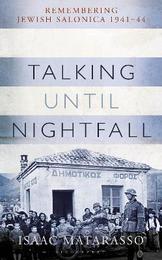
|
Talking Until Nightfall: Remembering Jewish Salonica, 1941-44
Hardback
Main Details
| Title |
Talking Until Nightfall: Remembering Jewish Salonica, 1941-44
|
| Authors and Contributors |
By (author) Isaac Matarasso
|
|
Translated by Pauline Matarasso
|
| Physical Properties |
| Format:Hardback | | Pages:272 | | Dimensions(mm): Height 216,Width 135 |
|
| Category/Genre | Memoirs
Judaism |
|---|
| ISBN/Barcode |
9781472975881
|
| Classifications | Dewey:940.5318092 |
|---|
| Audience | |
|---|
| Illustrations |
8 black and white illustrations
|
|
Publishing Details |
| Publisher |
Bloomsbury Publishing PLC
|
| Imprint |
Bloomsbury Continuum
|
| NZ Release Date |
20 October 2020 |
| Publication Country |
United Kingdom
|
Description
'Whoever listens to a witness, becomes a witness.' - Elie Wiesel When Nazi occupiers arrived in Greece in 1941, it was the beginning of a horror that would reverberate through generations. In the city of Salonica (Thessaloniki), almost 50,000 Jews were sent to Nazi concentration camps during the war, and only 2,000 returned. A Jewish doctor named Isaac Matarasso and his son escaped imprisonment and torture at the hands of the Nazis and joined the resistance. After the city's liberation they returned to rebuild Salonica and, along with the other survivors, to grapple with the near-total destruction of their community. Isaac was a witness to his Jewish community's devastation, and the tangled aftermath of grief, guilt and grace as survivors returned home. Talking Until Nightfall presents his account of the tragedy and his moving tribute to the living and the dead. His story is woven together with his son Robert's memories of being a frightened teenager spared by a twist of fate, with an afterword by his grandson Francois that looks back on the survivors' stories and his family's place in history. This slim, wrenching account of loss, survival, and the strength of the human spirit will captivate readers and ensure the Jews of Salonica are never forgotten.
Author Biography
Dr Isaac Matarasso was born in Salonica in 1892, when the city was part of the Ottoman Empire. He studied medicine at the University of Toulouse, and published his thesis in 1917. He practised in Salonica until his arrest in 1943, and organised health services for the Jewish survivors after the German withdrawal. He moved to Athens in 1947, with his wife Andree and son Robert, where he resumed medical practice until his death in 1958.
ReviewsThe resurrection and enhancement of [this] 1948 manuscript is a triumph ... A unique Holocaust memoir. * Kirkus Reviews * Powerful ... This poignant eyewitness account articulates the human cost of the Holocaust. * Publishers Weekly * A poignant, gripping, and beautiful multigenerational look at life before and during the Holocaust, as well as the process of rebuilding after the war. * Library Journal * The book is one of the most moving books I've ever read and truly unique ... Matarasso is revealed in a series of poignant literary snapshots - some taken by others, some by himself - which give the book a unique, multi-layered perspective. They utterly confound my neat rabbinic categorisations and convey the unbearable anguish of faith and truth. * Rabbi Tony Bayfield, former Head of Britain's Movement for Reform Judaism and author of Being Jewish Today * Powerful ... Dr Matarasso's calm and humane narrative tells a story too little known. * The Tablet * Extraordinary ... An account of the destruction of the Jewish population of Salonica, now Thessaloniki, during the Second World War, related by a man who was at its heart. * New European *
|